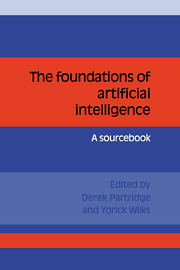Book contents
- Frontmatter
- Contents
- List of contributors
- Preface
- Acknowledgments
- 1 Introduction
- 2 The formal foundations of AI
- 3 Levels of theory
- 4 Programs and theories
- 5 The role of representations
- 6 The role of programs in AI
- 7 Rational reconstruction as an AI methodology
- 8 Is AI special in regard to its methodology?
- 9 Does connectionism provide a new paradigm for AI?
- 10 The role of correctness in AI
- 11 Limitations on current AI technology
- 12 Annotated bibliography on the foundations of AI
- Index of names
6 - The role of programs in AI
Published online by Cambridge University Press: 03 May 2010
- Frontmatter
- Contents
- List of contributors
- Preface
- Acknowledgments
- 1 Introduction
- 2 The formal foundations of AI
- 3 Levels of theory
- 4 Programs and theories
- 5 The role of representations
- 6 The role of programs in AI
- 7 Rational reconstruction as an AI methodology
- 8 Is AI special in regard to its methodology?
- 9 Does connectionism provide a new paradigm for AI?
- 10 The role of correctness in AI
- 11 Limitations on current AI technology
- 12 Annotated bibliography on the foundations of AI
- Index of names
Summary
If there are defining characteristics of AI, one must be the centrality of programs. Computer science or software engineering might be considered to have a better claim to this characteristic, but closer inspection of the role of programs within those fields reveals that not to be so. Formal specifications and means of realizing them in machine-executable representations dominate these fields; individual programs are relatively secondary in importance. But in AI implementations (programs) have always played the central role.
Bundy offers a three-fold division of AI, and claims that the role of a program is dependent upon which subdivision some particular AI work falls within. His three categories of AI are “applied AI,” “cognitive science,” and “basic AI.” It is important to sort out these issues (he claims) if we are to cure the “methodological malaise” in AI.
Dietrich then argues that a keystone in the foundations of modern AI is that intelligent thought is symbol manipulation, and, moreover, symbol manipulation of the type manifest in Turing-von-Neumann computers. Hence, the search for AI is reduced to finding the right program, but with no guide as to how to find it.
The role of programs in AI (according to Dietrich) is little better than random attempts to hit upon this program (or class of algorithms) whose existence (but little else) is promised by the foundational theory.
Information
- Type
- Chapter
- Information
- The Foundations of Artificial IntelligenceA Sourcebook, pp. 213 - 214Publisher: Cambridge University PressPrint publication year: 1990
